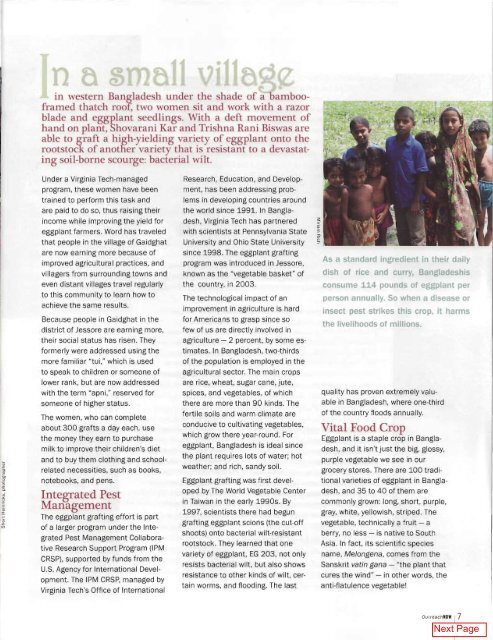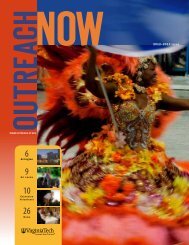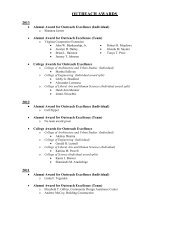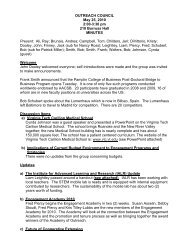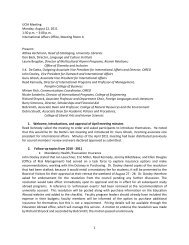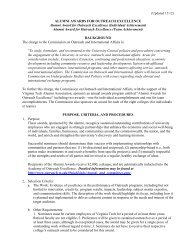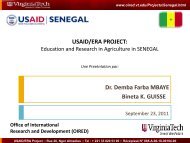Beautiful Gardens - Outreach & International Affairs - Virginia Tech
Beautiful Gardens - Outreach & International Affairs - Virginia Tech
Beautiful Gardens - Outreach & International Affairs - Virginia Tech
- No tags were found...
You also want an ePaper? Increase the reach of your titles
YUMPU automatically turns print PDFs into web optimized ePapers that Google loves.
in western Bangladesh under the shade of a bambooframedthatch roof, two women sit and work with a razorblade and eggplant seedlings. With a deft movement ofhand on plant, Shovarani Kar and Trishna Rani Biswas areable to graft a high-yielding variety of eggplant onto therootstock of another variety that is resistant to a devastatingsoil-borne scourge: bacte.rial wilt.-§.ro;;;,o~"-Under a <strong>Virginia</strong> Tec~-managedprogram, these women have beentrained to perform this task andare paid to do so, thus raising theirincome while improving the yield foreggplant farmers. Word has traveledthat people in tr,e village of Gaidghatare now earning more because ofimproved agricultural practices, andvillagers from surrounding towns andeven distant vi!lages travel regularlyto this community to learn how toachieve the same resu'lts.Because people in Gaidghat in thedistrict of Jessore are earning more,their social status has risen. Theyformerly were addressed using themore familiar "tui," which is usedto speak to children or someone oflower rank, but are now addressedwith the term "apni," reserved forsomeone of higher status.The women, who can completeabout 300 grafts a day each, usethe money t;hey earn to purchasemilk to improve their children's dietand to buy them clothing and schoolrelatednecessities, such as books,notebooks, and pens.Integrated PestManagementThe eggplant grafting effort is partof a larger program under the IntegratedPest Management CollaborativeResearch Support Program (IPMCRSP), supported by funds from theU.S. Agency for <strong>International</strong> Development.The IPM CRSP, managed by<strong>Virginia</strong> <strong>Tech</strong> 's Office of <strong>International</strong>Research , Education, and Development,has been addressing problemsin developing countries aroundthe world since 1991. In Bangladesh,<strong>Virginia</strong> <strong>Tech</strong> has partneredwith scientists at Pennsylvania StateUniversity and Ohio State Universitysince 1998. The eggplant graftingprogram was introduced in Jessore,known as the "vegetable basket" ofthe country, in 2003.The technological impact of animprovement in agriculture is hardfor Americans to grasp since sofew of us are directly involved inagriculture - 2 percent, by some estimates.In Bangladesh, two-thirdsof the population is employed in theagricultural sector. The main cropsare rice, wheat, sugar cane, jute,spices, and vegetables, of whichthere are more than 90 kinds. Thefertile soils and warm climate areconducive to cultivating vegetables,which grow there year-round. Foreggplant, Ban@ladesh ,is ideal sincethe plant requires lots of water; hotweather; and rich , sandy soil.Eggplant grafting was first developedby The World Vegetable Centerin Taiwan in the early 1990s. By1997, scientists there had begungrafting eggplant scions (the cut-offshoots) onto bacterial wilt-resistantrootstock. They learned that onevariety of eggplant, EG 203, not onlyresists bacterial wilt, but also showsresistance to other kinds of wilt, certainworms, and flooding. The lastAs a standard Ingredient in their dallydish of rice and curry, Bangladeshisconsume 114 pounds of eggplant perperson annually. So when a disease orinsect pest strikes this crop, it harmsthe livelihoods of millions.quality has proven extremely valuablein Bangladesh, where one-thirdof the country floods annually.Vital Food CropEggplant is a staple crop in Bangladesh,and it isn't just the big, glossy,purple vegetable we see in ourgrocery stores. There are 100 traditionalvarieties of eggplant in Bangladesh,and 35 to 40 of them arecommonly grown: long, short, purple,gray, white, yellowish, striped. Thevegetable, technically a fruit - aberry, no less - is native to SouthAsia. In fact, its scientific speci'esname, Me/ongena, comes from theSanskrit vatin gana - "the plant thatcures the wind " - in other words, theanti-flatulence vegetable!'" ''''''''1 7


